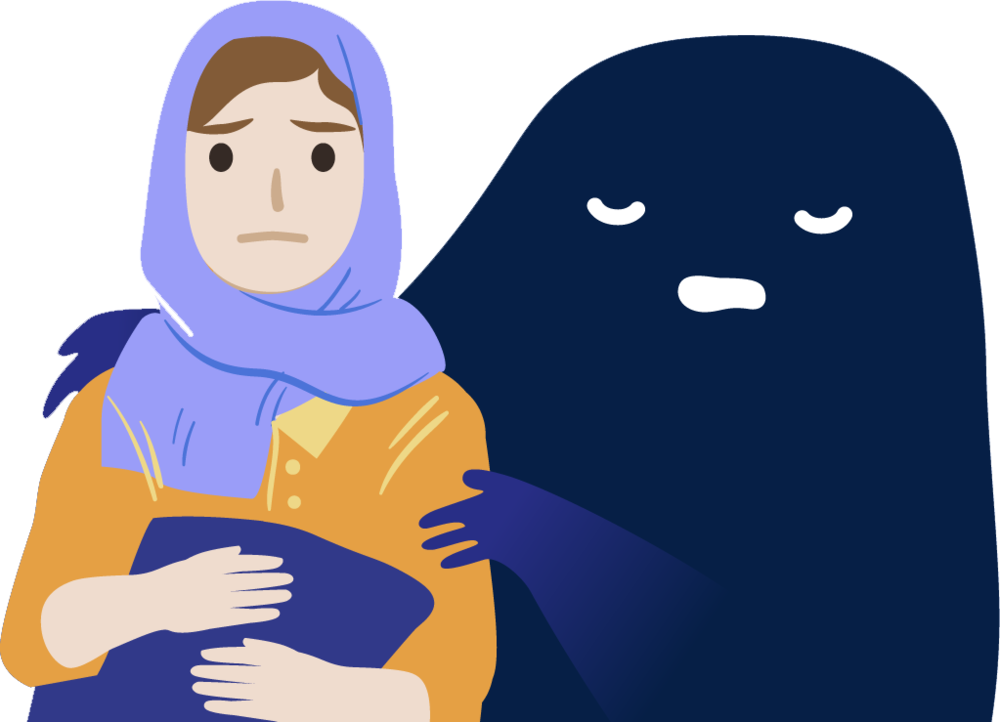
Individual therapy is a psychological treatment method that is geared towards helping people work through their mental health-related problems. It can also be referred to as psychotherapy, counselling, and talk therapy.
We work with people who need support with a wide range of challenges, including: depression, anxiety, anger, panic, grief, phobia, trauma, abuse, and self-esteem. We use evidence-based treatments to teach you coping strategies to enhance your mental health.
We also work with people who want to learn new skills to improve their well-being, relationships, and productivity, drawing from the field of positive psychology.
The individual therapy we offer in Dubai is an effective treatment for several mental and emotional issues. This therapy can both relieve symptoms of disorders, as well as have long term effects on your thoughts, emotional processing, behaviour, and well-being. The goal of individual therapy is to help improve the quality of your life by identifying and resolving a range of social, relational, and psychological problems.
Whether you are facing long-standing disorders or current immediate stresses, individual therapy can provide you with insightful problem-solving skills to increase positive feelings and control negative ones. You will learn skills to change your thought patterns, cope with stressful and difficult situations, make healthy decisions, and improve social relationships. This then promotes self-awareness and self-growth.
When to seek therapy
If you are experiencing negative thoughts, feelings, and behaviours that are causing distress or start interfering with daily life it would be beneficial to start therapy. You should also seek help if you start experiencing mental health symptoms before they get more severe. Additionally, if you feel overwhelmed and helpless, are constantly uneasy/on edge, cannot focus on and complete work, or have thoughts about harming yourself or others you should seek therapy.
You should reach out to a professional if the issue:
takes up more than an hour of your day every day
makes you want to avoid places and situations
negatively impacts your relationships
causes an inability to complete work and daily activities
has caused social withdrawal
has decreased your quality of life
has persisted for more than six months
What can individual therapy treat/help with
Therapy can help with mental, emotional, behavioural, and physical concerns.
Individual Therapy can help treat disorders such as:
Trauma disorders (including Post Traumatic Stress Disorder (PTSD)
Attachment issues in close relationships with parents and partners
Sleeping Disorders
Substance Use Disorder
Individual Therapy can be beneficial in times of hardship and can help you process loss/grief, divorce or breakup, unemployment, and failure. Additionally, it can also help manage issues such as stress, anger, abuse, extreme negative emotions, fatigue, and phobias.
Process of individual therapy
Initially, your psychologist will gather important past and present information to diagnose the problem and create a treatment plan with a specific therapy. They will discuss with you what concerns you have and your treatment goals. The first few sessions will allow you to get more comfortable and build a relationship with your psychologist, while they continue to learn more about you and your mental health conditions. As individual therapies are ‘talk therapies’, you will be encouraged to speak and share about your life, including difficult experiences. Although this may be difficult at the start and can cause you to feel upset or angry, your therapist will help you develop the confidence and skills needed to process these emotions.
After this, you can both decide the best plan of action by discussing the form of therapy to use, and the frequency and number of sessions needed. The way in which the specific therapy will then be practiced depends on the issues at hand and your requirements. Your wants and needs will matter greatly in the process. You may also be assigned homework to work on and build on the strategies covered in the therapy.
Over time you will develop coping techniques and healthy thought and behaviour patterns, improving your overall mood and wellbeing.
Therapeutic Approaches
There are many forms of psychotherapy. The therapy used depends on what issue needs to be solved. The four main psychological approaches to therapy are:
Humanistic:
Here, your capacity to achieve your highest potential and make rational decisions is emphasized. The aim is to transfer energy spent on past negative experiences, to work on your self-growth, -determination, and -actualization. You are given the power to decide what you want from the therapy. Important themes in this approach are concern, interest, awareness, free will, and responsibility.
Behavioural:
This individual therapy approach is based on the theory that behaviour is learned and focuses on the role of learning in the development of positive and negative behaviours. This includes conditioning and desensitizing. In behavioural therapies, unwanted harmful behaviours are modified and corrected by using reinforcements.
Cognitive:
In this individual therapy approach, people’s thoughts are emphasized over their behaviours, and the present is emphasized over the past. This is aimed towards problem-solving by focusing on how your thinking can impact your feelings and behaviours. By changing your thought pattern, you can change how you feel and react to things, and thus how you act.
Psychoanalytical/Psychodynamic:
Also known as the historical perspective, this therapy approach is based on the theory that unconscious forces drive behaviour. In this approach your past relationships, specifically, your childhood experiences, are analyzed and applies to your current life and conditions. The theory is that after bringing these past issues to the surface and processing them, you can then start to heal. It can consist of techniques such as free association, dream analysis, and transference. You learn about yourself by exploring and uncovering unconscious motivations with the psychologist, which then helps you change problematic thoughts, feelings, and behaviours.
Holistic/Integrative:
This individual therapy approach consists of integrating various ideas from different theories into one therapy. Here a psychologist can blend different elements to create a specific treatment best suited for you and your needs. Holistic approaches can also include non-verbal and non-traditional therapies.
Cognitive Behavioural Therapy, one of the most effective therapies for a variety of disorders, is a combination of both the behavioural and the cognitive approaches to focuses on thoughts and behaviours.
Types of individual therapy offered at Thrive in Dubai
Cognitive Behavioral Therapy
Cognitive behavioural therapy (CBT) is one of the most effective and widely used types of therapy. CBT stems from a combination of cognitive and behavioural therapies. It is based on the idea that the way you think and feel affects the way you behave. CBT changes the unhealthy thoughts and feelings that cause maladaptive behaviour and mental disorders to healthy positive ones. This then provides you with skills that promote productive responses in times of distress. Children, adolescents, and adults can all use CBT, and it can be applied to various mental health conditions. It is aimed at specific problems and typically involves around 6-20 sessions depending on the issue at hand.
CBT has been found to be effective in the treatment of anxiety disorders, phobias, depressive disorders, post-traumatic stress disorder, obsessive-compulsive disorder, panic disorders, and eating disorders. It also helps with stress, anger issues, marital problems, and social withdrawal. Additionally, CBT can relieve the distress associated with chronic pain.
Cognitive Analytical Therapy
Cognitive analytical therapy (CAT) is based on methods from CBT and psychodynamic therapy and aims to see how your behaviour leads to problems and how to improve it.
At first, you will discuss past events and experiences with a psychologist, and they will help you understand how that impacts the way you think, feel, and behave now. Your problem patterns will be mapped out so you can understand them and your psychologist will plan how to change these patterns. Self-help and experimentation can help with this.
Trauma-Focused Cognitive Behavior Therapy
This is a form of CBT that specifically focuses on the needs of individuals who have experienced trauma and are struggling with its effects. Trauma-focused cognitive behavior therapy (TF-CBT) aims to relieve issues such as post-traumatic stress and mood disorders linked to traumatic experiences. TF-CBT can be beneficial if you have lived through traumatic events such as abuse, violence, or grief. It can also help with depression and anxiety as a result of trauma. However, if there are behavioural and substance abuse problems linked to the trauma, another form of therapy might be better to start with before following up with TF-CBT.
Mindfulness-Based Cognitive Therapy
Mindfulness-based cognitive therapy (MBCT) is a form of cognitive therapy that incorporates mindfulness practices into it. Using techniques such as meditation and breathing exercises, you will learn to detach from maladaptive thought patterns that lead to depressed moods. MBCT aims to teach clients how to fight depressive thoughts before they spiral into major depression.
It is mainly used for people who experience recurring depression and unhappiness. Research has shown it is effective in treating patients with major depressive disorder, and those with depression symptoms due to health conditions. MBCT also works to prevent relapses. The relapse prevention techniques used in mindfulness-based therapy can also help with anxiety disorders and addiction.
Existential Therapy
This is a humanistic therapy that focuses more on you than just the symptoms. It uses free-will, self-determination, and causes you to search for meaning. Existential Therapy encourages you to reach your maximum potential and make healthy and wise choices. It is based on the fact that people should be self-aware and must rebuild themselves as the meaning of life is ever-changing. It focuses on enhancing experiences such as love, care, acceptance, courage, and self-actualization, and alleviating feelings of anxiety, depression, shame, anger, and apathy.
Existential Therapy can be used for conditions such as substance abuse, psychosis, anger management, and social avoidance. It teaches people to take control and make meaningful decisions.
Relational Therapy
Relational Therapy is based on the idea that social relationships are vital for human well-being. As these relationships should be mutually satisfying, it takes socio-economic and demographic factors into account to see how they affect your personal relationships.
Relational Therapy is a good choice if you are experiencing issues within your family, intimate, work, or social relationships. It can help enhance your self-esteem and cope with stress better, especially in social situations. It is also helpful for conditions such as anxiety, depression, eating disorders, mood disorders.
Art Therapy
While conventional therapy for individuals depends on talk therapy, some types allow more expressive forms, like music, drama, or art therapy. Using techniques such as drawing, coloring, painting, or sculpting, art therapy can allow you to express yourself in a non-verbal artistic way. From this, the emotional and psychological undertones in your art can be evaluated. You can deduce the meaning of your work through meetings with an accredited art therapist. The art therapist will look to find associations by using the artwork to help reignite memories and stories that may uncover unconscious thoughts and beliefs. This understanding of your emotions and feelings will help to resolve deeper issues
Art therapy can be helpful to people of all age groups for reducing stress, managing addictions, and improving symptoms of anxiety and depression. It can also be helpful in enhancing self-esteem and dealing with a disability or physical illness.
Emotionally-Focused Therapy
Emotionally focused therapy (EFT) is a short-term form of therapy focusing on relationships and attachments. It uses emotions to provide insight and promote healing by developing trust. This can then help you move the relationship forward in a healthy direction. You will work with a psychologist to overlook past relationship patterns and learn how to form a more secure attachment. You can learn to improve your relationship and how to act adaptively in a conflict.
EFT improves symptoms of anger, fear, betrayal, and lack of trust in a relationship. It is also effective in treating moderate depression and resolving issues stemming from trauma or childhood abuse.
Dialectical Behavior Therapy
Dialectical behavior therapy (DBT) can provide you with the tools and techniques to deal with difficult emotions and reduce relationship conflict. It focuses on four main areas: mindfulness, distress tolerance, emotion regulation, and interpersonal effectiveness. This helps you to accept the present moment, increase tolerance towards negative emotions, manage and change problematic emotions, and enhance healthy communication.
Apart from improving emotional regulation and relationships, DBT can help you cope with stress and suicidal thoughts. It can also help stop self-harm. By using an acceptance-based structure and problem solving, DBT can treat chronic and severe mental health conditions such as borderline personality disorder, depressive disorders, eating disorders, post-traumatic stress disorder, bipolar disorder, and substance abuse disorder.
Humanistic Therapy
Humanistic therapy or humanism is a form of positive therapy that focuses on you and your individual nature instead of your condition in general. Here the psychologist will observe you and your behaviours from your viewpoint. Humanistic therapy aims to emphasize your positive traits and personal instincts to allow you to grow, heal, gain wisdom, and feel fulfilled. It can help you reach your potential, find personal meaning and purpose, feel whole, be comfortable with yourself.
It can be used to treat depressive disorders, anxiety disorders, panic disorders, and personality disorders, as well as addiction and schizophrenia. Humanism can also alleviate family and personal relationship issues and improve self-esteem.
Psychoanalytic/Psychodynamic Therapies
Psychoanalytic therapy and psychodynamic therapy are in-depth therapies that are based on psychoanalysis. They bring forward unconscious thoughts and feelings to the conscious mind.
This allows suppressed emotions and past memories to be brought out and managed.
In psychoanalytic therapy, the client-therapist relationship is crucial as together you will get into and examine how repressed past experiences have affected your current thoughts, behaviours, and relationships. This takes time and commitment as it involves altering deeply ingrained maladaptive thoughts and behaviours. Psychoanalytic therapy helps to treat depression, personality disorders, trauma, neurotic and self-destructive behaviours, emotional struggles, and relationship problems. Research findings showed that around 80% of patients reported improvements in their symptoms, relationship issues, well-being, and quality of life after psychoanalytic therapy.
In psychodynamic therapy, your relationship with your external world is as crucial as you explore unconscious thoughts and the impact of your past on your present. Psychodynamic therapy is usually shorter and less intensive than psychoanalytic therapy, as it focuses on getting fast solutions to more immediate issues. Psychodynamic therapy helps to treat depression, social anxiety, eating disorders, and addiction. It can also help you discover the meaning of life and teach you the tools to form and maintain healthy relationships.
Benefits of therapy
Apart from helping you manage symptoms of disorders and treating several mental health-related conditions, therapy can have many benefits. Therapy makes you gain a better understanding of yourself by helping you identify the underlying causes of certain issues. It also provides you with coping strategies to use in different situations which can then help you handle emotions better. Therapy can also rekindle strained relationships and improve your social skills to enhance your support network. It also encourages you to make lifestyle changes as you learn what works for you and what doesn’t. Other than this, just talking to someone can help take a load off you when you are feeling overwhelmed and stressed with short-term problems.
Effectiveness of individual therapy
Psychotherapy can be highly effective in treating a variety of mental health conditions. Even if it does not ‘cure’ a disorder, it will provide you with skills and techniques to cope with the problem. Research has proven that therapy results in fewer relapses of disorders such as depression and anxiety, and it results in positive effects outside of treatment. These improved results are long-term and continue after the treatment ends. Due to the longevity of the results, therapy is more effective than medication treatments.
The forms of therapies offered at Thrive are evidence-based, thus have been found to be effective through research studies.
However, the overall effectiveness of the therapy will depend on how much determination, effort, and time you put into it. You must believe in and work on what you learn in the therapy sessions and apply them to daily life.
FAQs
What is the most effective therapy?
There is no one ‘best’ therapy. Different therapeutic approaches and different forms of therapy must be used for different conditions. What works for one person and one problem may not work on another. It can also depend on what you are open to, therapy will not work if you do not believe in it. This is why it is important to discuss with your psychologist what will work best for you. One of the most commonly used therapies, however, is Cognitive Behaviour Therapy.
How long is the process?
Individual therapy sessions usually last 45-60 minutes. The frequency and number of sessions can depend on several things such as how severe the issue is, how long the specific therapy takes to be effective, if you are seeking short-term or long-term therapy, the number of symptoms to resolve, and your progress. Depending on these factors, it can take weeks, months, or years. Sessions are usually held weekly, however, some people may need to meet more often.
Is therapy better than medication?
Medication alone only works to manage symptoms while taking the drug. Once you go off it, the effects disappear. Therapy on the other hand is far more long-term and equips you with the skills you may need for various other problems. Individual therapy can be used for the short-term, to focus on current issues, or the long-term, to get into more complex issues; Medication cannot offer this. There are also no side effects or addiction to therapy, unlike with medication.
How can you make therapy more effective?
One of the most important things in the effectiveness of therapy is the client’s determination. Only if you want to heal, believe in the therapy, and are willing to put in the effort it takes, will you get better. This is crucial for meeting the therapeutic goals. Although it may sometimes be difficult, you should attend all sessions and complete any additional homework or tasks.
Research also shows that the right therapist is highly important in the effectiveness of the treatment process. At Thrive we have highly skilled psychologists, specialized in a variety of areas. They are equipped to work with you to facilitate long-term therapeutic success.
The therapist-client relationship makes a big difference as you must feel comfortable to be open and honest. Patience and being optimistic about the treatment plan can also help ensure greater effectiveness.

Wondering if our services are right for you?
We are here to support you if you are:
Feeling sad, down, and lonely
Experiencing high levels of stress, worry, and anxiety
Having difficulty managing your anger and aggressive behavior
Avoiding certain people places or things because they make you panic
Grieving a significant loss
Needing to process a traumatic experience
Feeling negatively about yourself
Looking for new ways to enhance your well-being, relationships, and productivity

Your life and well-being are important. We are here to support you.






















